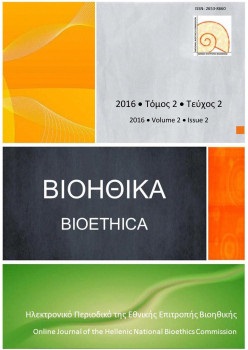Γενετικά τροποποιημένες καλλιέργειες εναντίον βιοποικιλότητας; Επιστημονικές και φιλοσοφικές προκλήσεις
Abstract
Στο ζήτημα της εξισορρόπησης ανάμεσα στην περιβαλλοντική βιοποικιλότητα και τις έμφυτες οικολογικές παρεμβάσεις της γεωργικής βιοτεχνολογίας, μελέτες πολυετούς ανάλυσης, τεκμηριώνουν πως η απώλεια της βιοποικιλότητας, από γενετικά τροποποιημένες καλλιέργειες είναι λιγότερο σημαντική, σε σύγκριση με άλλες πρακτικές. Όθεν, πώς εξηγείται η διαμετρικά ακραία αντιπαράθεση μέρους της επιστημονικής κοινότητας στο ζήτημα; Τεκμαίρω πως η διένεξη είναι και φιλοσοφική, εκφραζόμενη κυρίως μέσω δύο αντιπαραβαλλόμενων υλιστικών προσεγγίσεων, της αναγωγιστικής (ή μοριακής) και της ολιστικής (ή οργανισμικής), η συγκριτική ανάλυση των οποίων καταδεικνύει, κατά την άποψή μου, την αδυναμία τους στην οριστική επίλυση τέτοιων διλημμάτων.
Η πρώτη ως ανθρωποκεντρική προσέγγιση, αποτυγχάνει να συνδέσει την έννοια της ακεραιότητας των οικοσυστημάτων με το ηθικό καθήκον, ενώ η δεύτερη ως βιοκεντρική προσέγγιση, δε λαμβάνει υπ’ όψιν τις συνέπειες στους ανθρώπινους πληθυσμούς, ενώ παράλληλα παρέχει περιορισμένη καθοδήγηση σε σχέση με τα περιβάλλοντα, στα οποία η γεωργία έχει ήδη αντικαταστήσει τη φυσική τάξη. Αντίθετα, η συλλογιστική του Norton προσφέρει μια νέα προοπτική, εφόσον αναγνωρίζει το ανθρώπινο καθήκον για τη διεξαγωγή της γεωργίας με έναν τρόπο, ο οποίος υποστηρίζει την ανθρώπινη επιβίωση σε αυτόν τον πλανήτη, ενώ ταυτόχρονα, διατηρεί και τις οικολογικές δυναμικές, οι οποίες συντηρούν αυτή τη ζωή. Βασιζόμενοι στον «ήπιο ανθρωποκεντρισμό», μπορούμε σύμφωνα με το Norton να οδηγηθούμε ευκολότερα στη «σύγκλιση» των πολιτικών πρακτικών, μέσω ενός «πλαισίου» ιεράρχησης των ηθικών επιλογών, αναφορικά με τα ζητήματα της γεωργικής βιοτεχνολογίας.
Article Details
- Come citare
-
Μυλωνά - Γιαννακάκου (Konstantina Mylona-Giannakakou) Κ. Π. (2016). Γενετικά τροποποιημένες καλλιέργειες εναντίον βιοποικιλότητας; Επιστημονικές και φιλοσοφικές προκλήσεις. Bioethica, 2(2), 5–18. https://doi.org/10.12681/bioeth.19778
- Fascicolo
- V. 2 N. 2 (2016): Bioethica
- Sezione
- Original Articles
Authors who publish with this journal agree to the following terms:
- Authors retain copyright and grant the journal right of first publication with the work simultaneously licensed under a Creative Commons Attribution CC BY 4.0 License, which allows for immediate free access to the work and permits any user to read, download, copy, distribute, print, search, or link to the full texts of articles, crawl them for indexing, pass them as data to software, or use them for any other lawful purpose. Appropriate credit must be given by citing the author(s) and the original publication in this journal.
- Authors are able to enter into separate, additional contractual arrangements for the non-exclusive distribution of the journal's published version of the work (e.g. post it to an institutional repository or publish it in a book), with an acknowledgement of its initial publication in this journal.
We encourage authors to deposit their articles, as well as data underlying the publications, in institutional and/or other appropriate subject repositories.
Bioethica permits and encourages authors to archive the final publication pdf in institutional (e.g. the repository of the National Hellenic Research Foundation) or other appropriate subject repositories (e.g. SSOAR repository for social sciences), in compliance with institutional and/or funder open access policies, after publication in the BIOETHICA. Authors must provide bibliographic details that credit publication in the journal, as well as related funding details (when applicable).
Lists of institutional and other subject-based academic open access repositories can be found listed by country at the registry http://opendoar.org/countrylist.php
If your institution does not possess a repository you may deposit a copy of your paper at no cost with www.zenodo.org , the repository supported for open access research in the EU by the European Commission, through the project OpenAIRE (www.openaire.eu )



